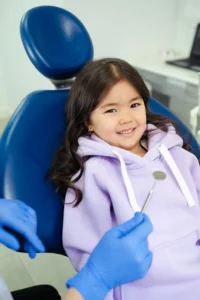 If your child’s pediatric dentist has recommended they have pulp therapy, also known as a root canal, it’s normal to have some concerns. If you have not had the procedure yourself, you might worry about certain rumors you’ve heard. There are many misconceptions about pulp therapy, especially when it involves children. There is no reason to worry. Here are the facts you need behind a few of the most common pulp therapy myths.
If your child’s pediatric dentist has recommended they have pulp therapy, also known as a root canal, it’s normal to have some concerns. If you have not had the procedure yourself, you might worry about certain rumors you’ve heard. There are many misconceptions about pulp therapy, especially when it involves children. There is no reason to worry. Here are the facts you need behind a few of the most common pulp therapy myths.
Myth: Pulp Therapy is Painful
Root canals may have been painful several decades ago, but new techniques make the procedure pain-free. Your child’s pediatric dentist will use a local numbing agent to block any pain. At most, they may feel some unusual sensations or pressure, but they will not have any outright pain.
Your child may also benefit from sedation dentistry, like nitrous oxide, better known as laughing gas. Although your little one won’t have any pain while in the dentist’s chair, their mouth can be tender for a couple of days after the effects of any medications wear off. You can manage it with an over-the-counter pain reliever.
Myth: Pulp Therapy Isn’t Necessary for Baby Teeth
It’s true, that baby teeth fall out in a few years, but that doesn’t mean they aren’t important. Every baby tooth is essential for your little one’s oral health and development. If a primary tooth is not treated with pulp therapy, it will die and need to be extracted. As a result, your child can be at risk of speech complications, alignment issues, and many other problems that could have been avoided with a root canal.
Myth: Pulp Therapy Is Only Needed If There’s Pain
A toothache is often treated with pulp therapy; however, pain isn’t always a sign that a tooth is infected. A root canal can protect a compromised tooth from additional damage. Your child’s pediatric dentist might find an issue during a routine cleaning and checkup. They can recommend pulp therapy before your child suffers any symptoms, like a toothache.
Myth: Pulp Therapy is Only a Temporary Solution
Whether performed on a baby tooth or an adult tooth, pulp therapy offers long-lasting, and often permanent improvement. You can help your child avoid new infections by supporting good oral hygiene habits. Your little one should brush their teeth at least twice a day and begin flossing daily around the age of five or six. Besides caring for their smile at home, schedule a cleaning and checkup every 6 months.
Your little one’s pediatric dentist will explain exactly what you can expect during their procedure. They will answer any questions or concerns to help you make an educated decision for your child’s dental health.
About Dr. Homer Sedighi
Dr. Sedighi achieved his dental degree at the Washington University School of Dental Medicine and continued his education to become a Licensed Pediatric Dentist. He provides compassionate care for children using the latest solutions in dentistry. Dr. Sedighi is a proud member of several professional organizations, including the American Academy of Pediatric Dentistry and the American Dental Association. Request an appointment through his website or call his office at (636) 777-7777.